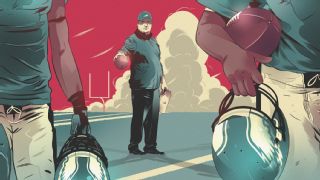|
This story appears in ESPN The Magazine's August 31 NFL Preview Issue. Subscribe today! FACED WITH A challenge far more grave than winning the NFC East, George Washington was named commander-in-chief of the Continental Army in June 1775. Before embarking on campaigns against the British, his first battle came in taking command of troops he hated. Washington reviled Massachusetts soldiers. According to Edward G. Lengel's General George Washington: A Military Life, Washington "regarded the common soldiers of that colony as 'an exceeding dirty & nasty people.'" In 1776, author David McCullough likewise writes that Washington found New Englanders "to be men of a decidedly different sort than he had expected, and he was not at all pleased." Reliance on a workforce has never required respecting or understanding it. Steelers corner Brandon Boykin seemed to understand this about his former coach in Philadelphia, Chip Kelly. Boykin's belief that Kelly had difficulty relating to black players was met with the kind of disingenuous, passive-aggressive shock that explains why the topic of race often feels so intractable in this country. The public and the media machine largely dismissed Boykin's comments as preposterous, a predictable reflex whenever a black athlete suggests the white mainstream fails to understand the black experience. Boykin then clarified his remarks, even though the Eagles provided all the necessary clarity in 2014 when they gave Riley Cooper a five-year, $25 million contract seven months after the receiver's use of a racist slur. Boykin, the thinking went, could not possibly be correct because, as a coach, Kelly leads dozens of highly paid black men, which is nearly as absurd as saying the manager of a nightclub cannot be sexist because the dancers he hires are women. The NFL's "next man up" culture treats its players as disposable, even as guaranteed money increases. So it would be unsurprising if Chip Kelly were a racist, or if he were simply uncomfortable with young black men. It would be equally unsurprising if neither of these things were true, but the anxious instinct to suggest Boykin was speaking irresponsibly ignores the fact that the tension he described between him and his white boss was unremarkable. There aren't any employees in this country -- even among the white males who represent the default position of American leadership -- who haven't had at least one boss who didn't "get" them. An "Is Kelly a racist or isn't he?" narrative is just the lazy masquerading as the profound, especially when Boykin never actually called Kelly a racist. Besides, the question obscures a larger reality: The NFL already has a problem with black people, the ones who don't stay in their lane, the ones who talk. The problem is true of football, just as it is with Major League Baseball and dozens of other industries across America, including the media. Every black person in America knows he must learn to navigate the white world to advance -- but that world needn't know very much or anything about him. It's the price of being a minority. Life isn't fair. It is why the NFL has a Rooney Rule, because people in positions of power hire their friends, the people they know, and once blacks stop scoring touchdowns and intercepting passes, they rarely become part of the club. It is why the four most important teams in the history of baseball -- the Yankees, Red Sox, Cardinals and, yes, the Dodgers of Jackie Robinson lore -- have never hired a black manager. It is why the NFL hired its first black head coach of the modern era 23 years after the NBA and 14 years after MLB and, in the 26 years since hiring Art Shell in 1989, has barely hired a dozen black head coaches. If these dynamics were not at work, neither the NFL nor MLB would have to force teams to interview minorities whenever a job comes open. What coaches don't have a problem with is Boykin's talent. There are 32 NFL teams and almost zero white starting running backs or cornerbacks. Washington disliked his workforce, but he needed it to win the war. Same goes for the NFL. Kelly might have an issue, he might not, but the routine reflex to dismiss the obvious historical reality that people from different racial, cultural and class backgrounds might struggle to understand one another in the workplace is a much bigger problem than Chip Kelly ever could be.
|


